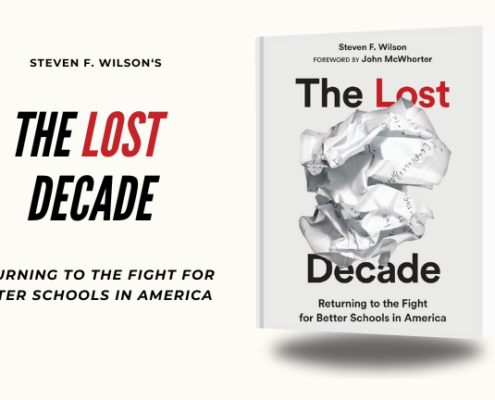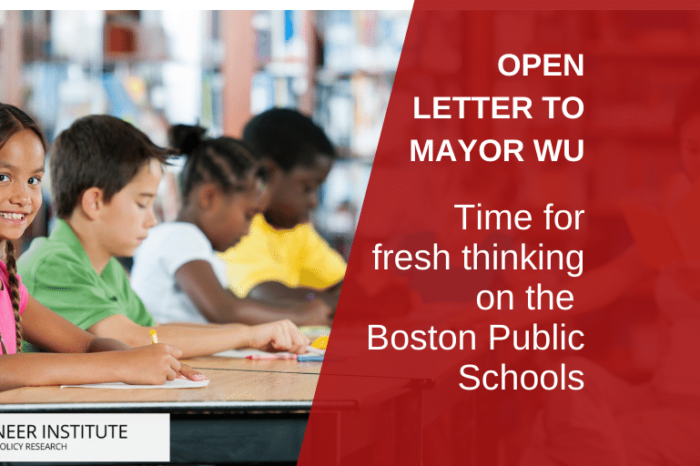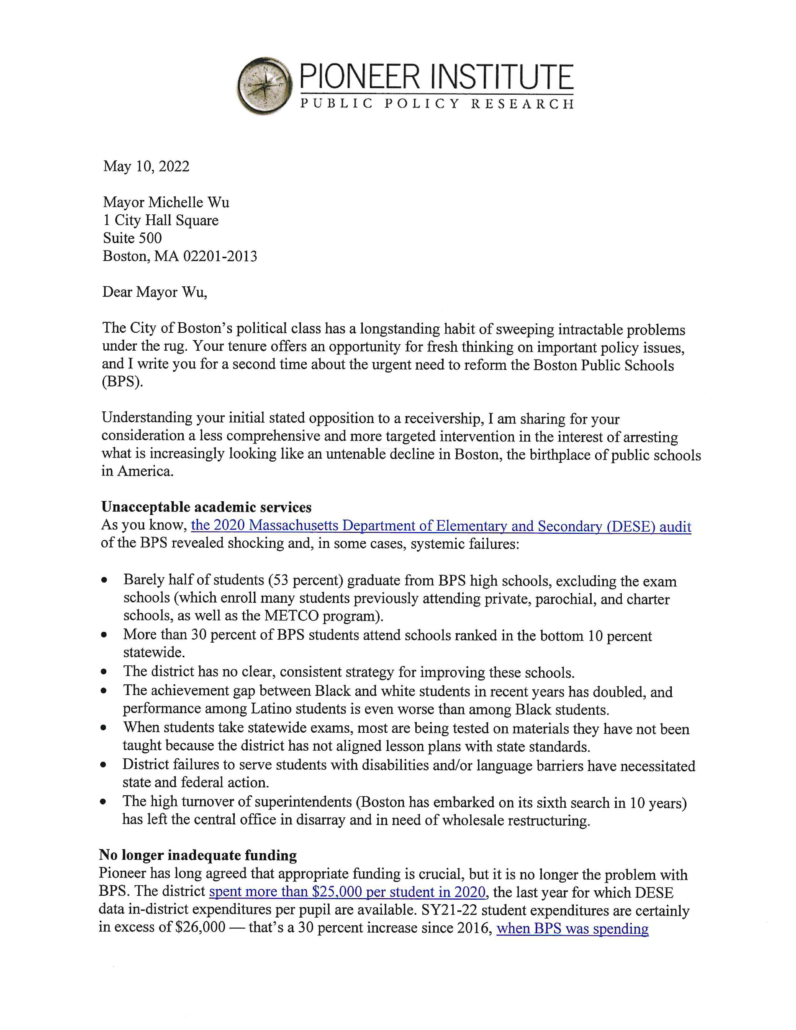Open Letter to Mayor Michelle Wu on the Boston Public Schools
/in Academic Standards, Featured, News, Related Education Blogs /by Editorial Staff Share on Facebook
Share on Twitter
Share on
LinkedIn
+
“Barely half of students (53 percent) graduate from BPS high schools, excluding the exam schools,” Pioneer Institute Executive Director Jim Stergios underscores at the start of this Open Letter to Boston Mayor Michelle Wu.
That’s just one in a long litany of troubles within the Boston Public Schools, much of which is due to chaotic management and at times even willful misleading of the public.
In this letter, Pioneer recommends fresh thinking, and, specifically, a highly focused and time-limited intervention, in partnership with the state department of education.
Get Updates on Our Education Research
Related Content:

UK’s Dr. Paula Byrne on Jane Austen’s 250th Anniversary
In this episode of The Learning Curve, co-hosts Alisha Searcy and Helen Baxendale celebrate the 250th anniversary of Jane Austen’s birth with Dr. Paula Byrne, Lady Bate, a distinguished biographer and literary critic. Dr. Byrne explores the key influences that shaped Austen’s life, the major themes of her novels, and the enduring relevance of heroines like Elizabeth Bennet and Elinor Dashwood. She also shares insights from her books The Real Jane Austen and The Genius of Jane Austen, shedding light on Austen’s love of theater and the lasting appeal of her works in Hollywood.

We Have a Long Way to Go for Massachusetts Residents to Have the Government Transparency We Deserve
As Pioneer Institute observes Sunshine Week,?we are disappointed by the legislature’s attempts to deny what the vast majority of voters want: an audit of the legislature by our State Auditor. Trying to avoid an audit further exacerbates the loss of public trust. After all, what are we left to think? Do they have something to hide? That is not the government our founders intended; nor is it what 72 percent of Massachusetts voters wanted. This year, during Sunshine Week, we are entirely focused on the top three actions to bring sunlight to the state legislature. They are:

EdChoice’s Robert Enlow on School Choice
In this episode of The Learning Curve, co-hosts U-Arkansas Prof. Albert Cheng and Alisha Searcy interview Robert Enlow, president and CEO of EdChoice. Mr. Enlow discusses his decades of leadership in school choice advocacy, from his early work with the Milton and Rose Friedman Foundation to spearheading policy reforms nationwide.

Frontier Institute’s Trish Schreiber on School Choice & Charter Schools in Montana
In this episode of The Learning Curve, co-hosts U-Arkansas Prof. Albert Cheng and Alisha Searcy interview Trish Schreiber, senior fellow in education at the Frontier Institute in Montana. Schreiber shares her journey from Silicon Valley to Montana and her passion for expanding educational opportunities.

The Lost Decade Calls for Replacing “Social Justice Education” with Education Rich in Liberal Arts, includes a foreword by John McWhorter
Book finds that marginalized students suffer most from turn away from academics

UK Oxford’s Robin Lane Fox on Homer & The Iliad
In this week’s episode of The Learning Curve, co-hosts Alisha Searcy and Dr. Helen Baxendale interview Robin Lane Fox, distinguished classicist and Emeritus Fellow at Oxford. Prof. Lane Fox offers profound insights into Homer’s Iliad and its enduring significance. He explores the epic’s historical and literary context, from its roots in oral tradition to its lasting influence on Western culture.

Director/Actor Samuel Lee Fudge on Marcus Garvey & Pan-Africanism
https://dts.podtrac.com/redirect.mp3/media.blubrry.com/3809857/api.spreaker.com/download/episode/64587551/thelearningcurve_samuelleefudge.mp3
In…

Cornell’s Margaret Washington on Sojourner Truth, Abolitionism, & Women’s Rights
In this week’s episode of The Learning Curve, co-hosts U-Arkansas Prof. Albert Cheng and Alisha Searcy interview Margaret Washington, the esteemed historian and author of Sojourner Truth’s America. Prof. Washington delves into Truth’s remarkable life, from her early years in slavery in New York to her transformation into a powerful abolitionist, women’s rights advocate, and religiously driven reformer. She explores Northern slavery, the Second Great Awakening, her famous “Ain’t I a Woman?” speech, and her Civil War-era activism. Prof. Washington also reflects on Truth’s enduring legacy as a symbol of justice, equality, and resilience in American history. In closing, Prof. Washington reads a passage from her book, Sojourner Truth’s America.




